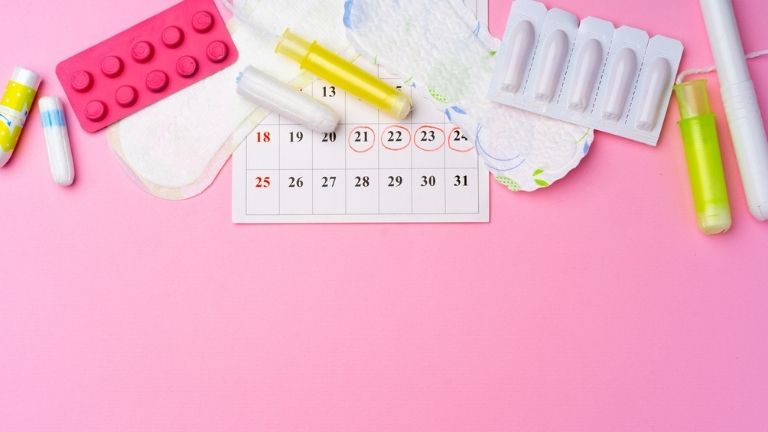Do you ever wonder if your heavy period is normal? Healthista spoke to Obstetrician & Gynaecologist, Dr Larisa Corda who explains all we need to know about menorrhagia
This article was developed and sponsored by Bayer.
Almost all women experience problems with their period from time to time. Whether that be heavy bleeding, irregular bleeding, or no bleeding at all.
For anyone unsure, a period is the lining of the womb falling away when there is no pregnancy.
One of the most common complaints surrounding periods is heavy menstrual bleeding (HMB)
A ‘normal’ period occurs every 28 days or so, but periods can also occur more or less often than this, ranging from day 21 to day 40 of a person’s menstrual cycle.
The flow tends to be heaviest in the first two days and can last anywhere between 3 and 8 days.
One of the most common complaints surrounding periods is heavy menstrual bleeding (HMB), estimated to affect as many as one in three women globally.
Also known as menorrhagia or ‘dysfunctional uterine bleeding’, this is heavy bleeding that occurs during your period.
A recent survey of 1,000 UK women aged 18 to 50 conducted by Bayer, looking into women’s experience of heavy menstrual bleeding, revealed some alarming findings.
Staggeringly, over half of survey respondents (59 per cent) either had HMB, or suspected they had it, and over 95 per cent of HMB cases had a significant impact on daily life – including having to potentially restrict their lives as a result of their heavy periods.
What’s more, 64 per cent of the women surveyed, felt that their HMB was entirely normal, with 37 per cent never having been to a medical professional at any stage of their life and potentially suffering in silence.
So, what is HMB/menorrhagia?
HMB/menorrhagia is quite difficult to define, as it differs from person to person.
‘Your period is classified as ‘heavy’ if it lasts more than seven days or the bleeding is extensive (say, you are soaking a tampon or sanitary towel every hour or so) and gets in the way of your daily life,’ explains Obstetrician & Gynaecologist, Dr Larisa Corda.
bleeding for longer than seven days constitutes heavy menstrual bleeding
‘Medically speaking, we tend to say that losing over 80ml during the entire duration of the period or bleeding for longer than seven days constitutes heavy menstrual bleeding’.
Doctors tend to define heavy periods as any one or more of the following:
- Bleeding that lasts more than seven days per cycle
- Bleeding so severe that a sanitary pad or tampon must be changed every hour for several hours in a row and during the night
- Heavy flow that keeps you from your normal activities, or even stops you from working
- Bleeding with large blood clots
- Feeling very tired and weak and often feeling depressed or moody
- Constant pain in the lower part of your stomach during your cycle
- Significant impact on quality of life
How does HMB/menorrhagia impact everyday life?
Menorrhagia can have a significant impact on a person’s daily activities and quality of life and can be very distressing.
Anyone who gets heavy periods may be familiar with physical symptoms such as anaemia (lack of iron in the blood), joint pain, headaches and migraines.
But there are also emotional symptoms such as depression, moodiness, anxiety or a lack of confidence.
‘Some women will have to plan their whole day around their period,’ says Dr Corda.
Menorrhagia can have a significant impact on a person’s daily activities
‘Plus, it can affect relationships, including social and intimate relationships, your job, as well as your mental and physical health. It can also potentially lead to anaemia leaving you feeling tired and washed out.
‘When I talk to women in clinic about what constitutes a heavy period, I tend to ask them in terms of how it impacts their lives and how it interferes with their ability to do normal everyday things.
‘For example, are they flooding through clothes? Needing to change sanitary towels or tampons frequently? Using a pad and tampon at same time? Constantly thinking about when they next need to take a toilet break?’
When to seek help?
Heavy periods are more common in the first few years after first starting menstruation, after childbirth, in the months running up to menopause and in the first few months of starting hormonal contraception.
Excessive stress and sudden weight loss can also lead to heavier periods.
please visit your GP and check out the NHS website which has lots of useful information
However, if your periods are concerning you, and you are frequently flooding through sanitary products, and/or passing blood clots, then you should seek professional help.
For anyone who is concerned that they might be suffering from HMB, please visit your GP and check out the NHS website which has lots of useful information, as well as www.myheavyperiods.co.uk, where a simple survey could help.
Please note that bleeding after sex and/or the menopause should always be checked out by a medical professional.
Treating HMB/menorrhagia:
The right treatment will depend on what the doctor finds is causing your HMB – which is why it’s important that you visit your GP if you are experiencing any of the symptoms mentioned above.
Your GP should also take a history detailing the length of your cycle, how long you bleed for, what contraception you use (if any), your fertility wishes and your smear history.
Talk about it
Nearly two thirds (63 per cent) of women surveyed said that there is still stigma associated with HMB and 80 per cent feel that the condition needs to be discussed more openly.
‘If there’s one thing that people should take away, it’s the fact that they shouldn’t suffer in silence, and that there is a lot of help available,’ says Dr Corda.
80 per cent feel that the condition needs to be discussed more openly
‘The sooner people have the confidence to go and see their doctor and speak to someone about the fact that potentially their periods may not be normal, the sooner they can get the help that they need’.
This article was developed and sponsored by Bayer
Job code: PP-UN-WHC-GB-0021
Date of preparation: August 2022
More Healthista Content:
15 Best Advent Calendars for December 2021
10 best natural remedies to boost immunity & fight off festive colds
4 ways the menopause affects your skin
5 ways to ease anxiety during menopause
A gynaecologist’s guide to painful sex
Like this article? Sign up to our newsletter to get more articles like this delivered straight to your inbox.

























































